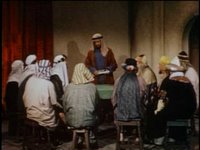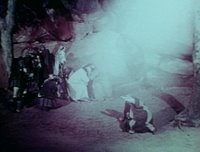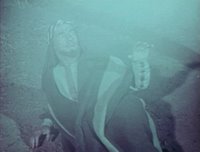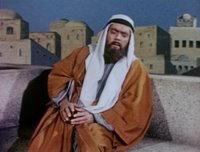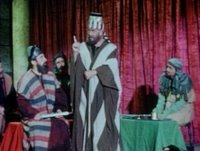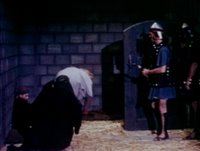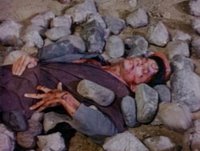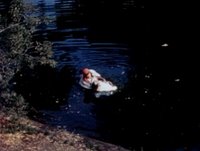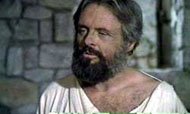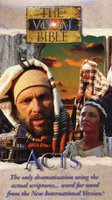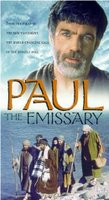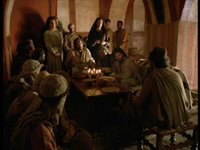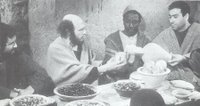Scene Comparion - Pentecost
Whilst there are quite a few film versions of a selection of stories from Acts a good number of them are Paul biopics and so are only really interested in Acts from the stoning of Stephen onwards. So films such as Paul the Emissary, Damascus, The Bible Collection's Paul and even, surprisingly, Peter and Paul all exclude this incident.There are however a number of films that do cover these events and here are some comments on a few of them.
Living Bible: Acts of the Apostles (1957)
If ever you want a stiff, very literal rendering of a story played out by men wearing tea towels, then The Living Bible comes up trumps every time. The budgetary limitations area always obvious so for the start of Acts the Ascension is narrated and the outpouring of the Holy Spirit and the tongues of fire all occur off screen. The rest of the scene is dull in the extreme.
Power of the Resurrection (1958)
Peter is stuck in jail with a young Christian who is scared and so he tells the boy how he met Jesus and gained the courage he now has. So the retelling of Peter's life climaxes with Pentecost. It's strange, then, that there's no tongues of fire scene here either. We do see Annas and Caiaphas in the crowd as Peter preaches. The most interesting feature of this film, for me, is that both the younger and the older Peter are played by Richard Kiley, who would play another disciple turned writer Matthew in the Visual Bible's Matthew. What's most interesting is comparing how the film makers thought Kiley would look like as an old man, and how he actually does look. Had I not seen the latter production, I would have thought it a reasonably credible piece of make-up, but as things stand it looks more than a little naïve.
Atti degli Apostoli (1969 - pictured)
Overall I think Rossellini's film is my favourite of those that deal with Acts, partly because while it is still an obviously low budget piece it makes that into a virtue, rather than a constantly distracting flaw, but then I'm a big fan of Rossellini in general.
Again there are no tongues of fire, but the sky does momentarily go dark red before the disciples burst out into the public square. It's a wonderful moment, partly because it's been preceeded by a long and rather dry exposition of the story's cultural and historical context (from one Roman to another), which both give a better feel for that context but also because the disciples sudden arrival on the scene forms a striking contrast with the more stoic Romans. Furthermore there is something ambiguous about the moment. One the one hand it evokes Joel's prophecy about the sun turning to darkness and the moon to blood, but on the other the disciples' absence from the moment distances them from it, as if to break the causal link.
My favourite line in this story has always been Peter's "they're not drunk it's only nine o'clock in the morning: I remember laughing about that one as a ten year old at church. The majority of these films deliver it in a very po-faced and forced fashion. Here, Peter dismissively chucks it out over his shoulder as he marches through the crowd. It's reminiscent of Pasolini's Jesus making terse theological or political statements over his shoulder as the disciples struggle to keep up.
And then there's the climax, as Peter, the disciples and a bunch of keen to be new converts all rush in a state of high excitement to a watering hole outside the city. Are they ecstatic or just mad? Rossellini leaves it up to the viewer to interpret it. I imagine both interpretations happened at the time so it's nice to see this captured in the film and both sides thrown up for the viewer to pick over.
Incidentally, did I ever mention that this film is available to view (albeit without subtitles) here?
A.D. (1985)
Just as the series intercuts the story of the early church with tales of the Romans here we get the first Pentecost intercut with the Romans leading an execution. And just as the series often brings both stories together at certain critical points, so it turns out that the man who is due to be executed and is subsequently rescued is a friend of Stephen and other early Christians.
Inside meanwhile Mary seems to be taking a leading role within the early church - you don't have to interpret it that way but it seems to be the implication. On this occasion, Mary tells a story from Jesus' childhood. And then a very quiet wind starts up inside but someone notices it's not blowing outside. The effects look dated and the soppy looks on the disciples faces are rather comical, but Peter delivers his speech with real charisma, and it's probably the best delivery of that sermon of all of these clips.
Visual Bible: Acts (1994)
Whilst the special effect here will hardly have broken the bank it's actually very effective. In contrast to many of the other version - and my own prior visualisation - the moment of the Spirit's coming is initially very serene rather than ecstatic. Very little else works here though. Dean Jones' narration is more obtrusive than Richard Kiley's in Matthew, the word for word aspect feels very forces and
James Brolin is just to handsome, clean cut and all-American to pass for Simon Peter. It's interesting comparing his charismatic proto-TV-politician with the hapless dimwit played by Gerrit Schoonhoven in the Matthew film.
Where the forced literalism really doesn't work is during the crowd's lengthy response to what they are seeing, especially the various members of the crowd taking turns to recite a selection of the nations represented there. It wouldn't have been funnier if they had all done it together Life of Brian style ("Yes we're all individuals... from Phrygia and Pamphylia, Egypt and the parts of Libya near Cyrene.)
St Peter (2005)
The start of this film is so awful I've never been able to get past the first quarter of an hour or so, and the relevant scene here crops up about 35 minutes in. It's certainly one of the more interesting and creative explorations of the scene. The outpouring of the spirit occurs just at the very moment that the disciples are beginning to realise that language might be a barrier to the spread of the gospel.
Inside the moment is strikingly depicted with flames shooting up in the arches behind Peter and the other apostles. Outside however a shock-wave seems to strike everyone in sight. In contrast with the other versions Peter says very little of the sermon from Acts. So effectively this take on the story emphasises experience over explanations.
The scene ends on a rather sour note however. A Roman soldier - the very one who was present at the death of Jesus - wants to be baptised as well, but Peter refuses. I'm interested to see how this pans out: I have a hunch the soldier in question may appear later in the film.
Labels: A.D. (Anno Domini), Acts of the Apostles, Atti Degli Apostoli, Living Bible Acts, Peter, Rossellini, Scene Comparisons, St. Peter, Visual Bible




















